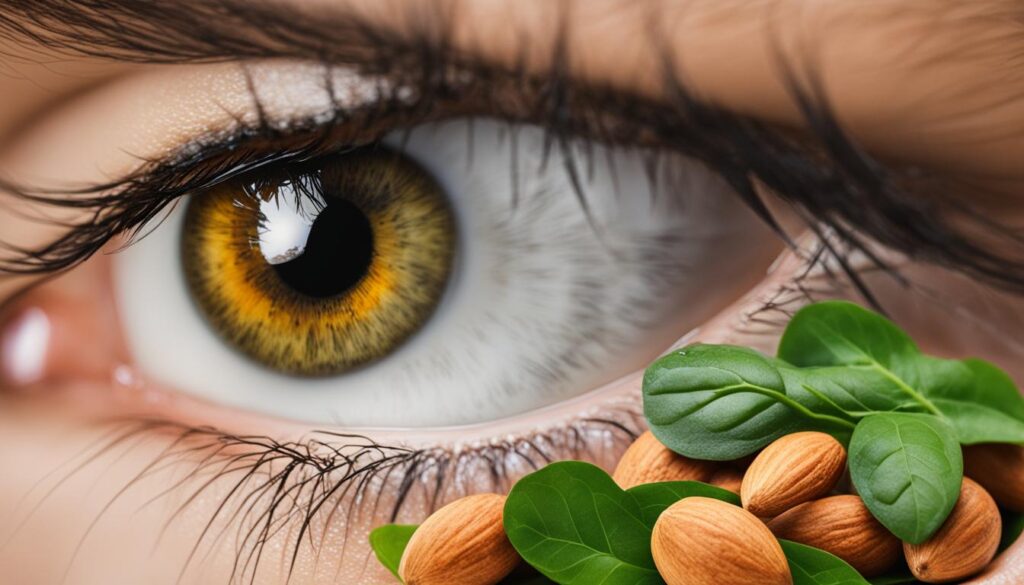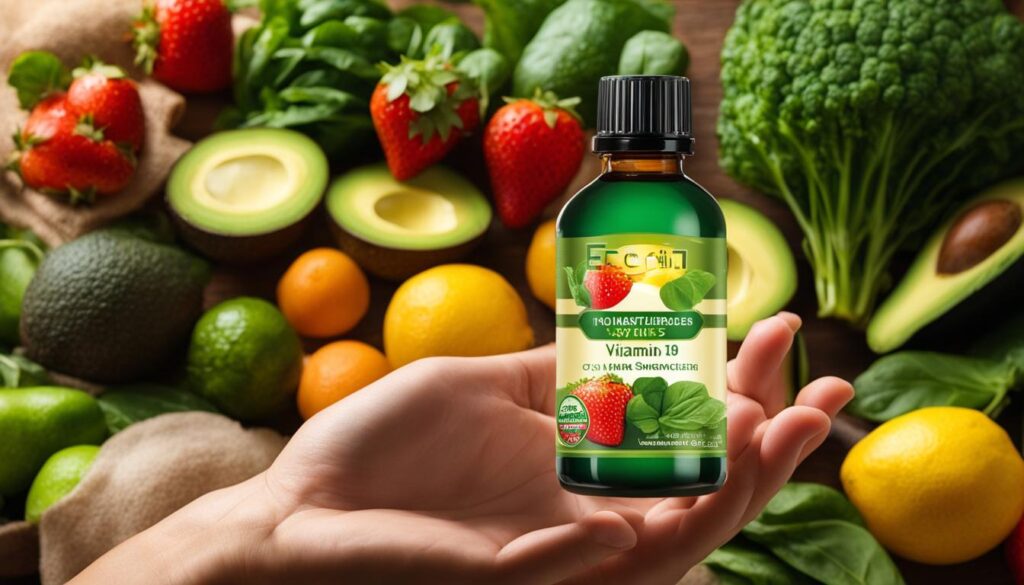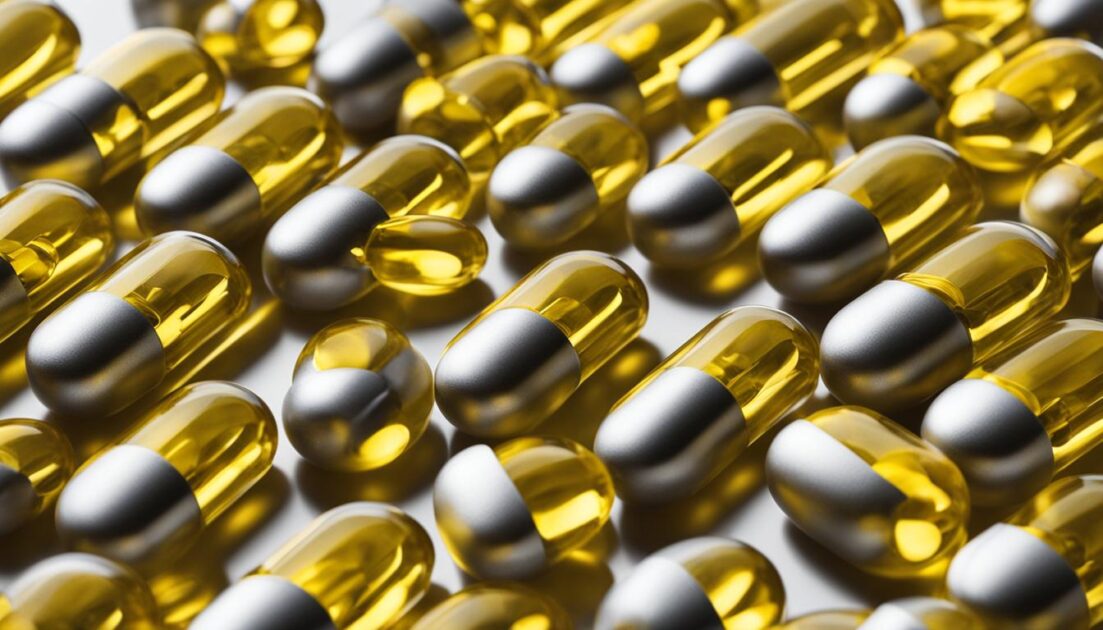When it comes to maintaining overall health, Vitamin E has a vital role to play. This essential nutrient not only supports the health of blood, brain, and skin, but it also acts as a powerful antioxidant, protecting cells from damage and contributing to the prevention of diseases like heart disease and cancer.
You can obtain Vitamin E from a variety of sources, including canola oil, olive oil, almonds, and leafy greens. It is also available in the form of supplements such as capsules or drops. However, it’s important to note that while Vitamin E has several potential benefits, it’s not without its considerations and precautions.
Key Takeaways:
- Vitamin E plays a crucial role in vision, reproduction, and the health of blood, brain, and skin.
- It acts as a powerful antioxidant, protecting cells from damage caused by free radicals.
- You can obtain Vitamin E from various food sources or supplements.
- High-dose supplementation may have potential benefits for Alzheimer’s disease and nonalcoholic fatty liver disease.
- However, there are concerns regarding the potential risks of Vitamin E supplements, including an increased risk of prostate cancer.
Benefits of Vitamin E for Skin

Vitamin E is known for its numerous benefits for the skin, making it a popular ingredient in skincare products. Its moisturizing and nourishing properties help to keep the skin soft, supple, and healthy.
One of the key benefits of Vitamin E is its antioxidant properties. As an antioxidant, it helps to protect the skin from damage caused by free radicals, environmental pollutants, and UV radiation. This can prevent premature aging, reduce the appearance of wrinkles, and promote a more youthful complexion.
Additionally, Vitamin E can help to reduce the appearance of scars and improve wound healing. It has been found to enhance the production of collagen, which is crucial for the formation of new skin cells. By promoting the growth of healthy skin tissue, it can help to fade scars and speed up the healing process.
Vitamin E is also known to have anti-inflammatory properties, which can soothe irritated and inflamed skin. Whether you’re dealing with dryness, redness, or other skin conditions like eczema or acne, Vitamin E can help alleviate these symptoms and promote a healthier complexion.
Many skincare products, including creams and oils, contain Vitamin E as a key ingredient. This allows individuals to easily incorporate the benefits of Vitamin E into their daily skincare routine. For those looking for more targeted benefits, applying Vitamin E oil directly to the skin can provide additional moisture and nourishment.
Top Vitamin E-Rich Foods for Skin Health
| Food Source | Vitamin E Content (per 100g) |
|---|---|
| Almonds | 26.2mg |
| Sunflower Seeds | 35.17mg |
| Spinach | 2.03mg |
| Avocado | 2.07mg |
| Olive Oil | 14.39mg |
Including Vitamin E-rich foods in your diet can also contribute to maintaining healthy skin. Foods such as almonds, sunflower seeds, spinach, avocado, and olive oil are excellent sources of Vitamin E.
In conclusion, Vitamin E offers a range of benefits for the skin, including moisturizing, nourishing, antioxidant, anti-inflammatory, and wound-healing properties. Whether incorporated into skincare products or consumed through a balanced diet, Vitamin E is a valuable nutrient for promoting skin health.
Vitamin E for Hair

Vitamin E is not only great for your skin, but it also offers numerous benefits for your hair. The use of Vitamin E can improve blood circulation to the scalp, which promotes hair growth and prevents hair loss. Additionally, Vitamin E is believed to have the ability to repair damaged hair follicles and reduce inflammation on the scalp. This essential vitamin also works to moisturize and nourish your hair, resulting in a shiny and healthy appearance. To experience the benefits of Vitamin E for hair, consider applying Vitamin E oil directly to your scalp. Not only will this provide moisture and nourishment, but it can also help to alleviate dry scalp and dandruff conditions.
Applying Vitamin E oil to the scalp directly can be a simple and effective way to enhance the health and appearance of your hair. Including Vitamin E supplements into your routine may also provide additional benefits. Consult with a healthcare professional to determine the appropriate dosage for your specific needs.
With regular use, Vitamin E can help you achieve and maintain healthy hair that shines with vitality.
Vitamin E for Immunity

Vitamin E plays a vital role in supporting a healthy immune system. Its antioxidant properties help protect our immune cells from damage caused by free radicals. In addition, vitamin E can enhance the activity of immune cells such as T cells and B cells, which are essential for a strong immune response.
Adequate intake of vitamin E is crucial for maintaining optimal immune function. While research on the specific effects of vitamin E on immunity is limited, it is believed that this nutrient can help support overall immune health.
To boost your immunity, consider incorporating vitamin E-rich foods into your diet, such as almonds, sunflower seeds, spinach, and broccoli. You can also opt for vitamin E supplements to ensure you’re meeting your daily requirements.
Benefits of Vitamin E for Immunity
- Antioxidant protection: Vitamin E helps protect immune cells from damage caused by free radicals.
- Enhanced immune cell activity: Vitamin E can enhance the activity of immune cells like T cells and B cells, promoting a stronger immune response.
- Overall immune health: While further research is needed, vitamin E is believed to have a positive impact on immune function and overall immune health.
“Vitamin E plays a crucial role in supporting a healthy immune system and protecting our immune cells from damage.”
While vitamin E can be beneficial for immunity, it’s important to note that supplements should never be used as a substitute for a healthy lifestyle, including a balanced diet and regular exercise. Before starting any supplementation, it is always recommended to consult with a healthcare professional to ensure it aligns with your specific health needs.
Vitamin E for Heart Health

Vitamin E has been extensively studied for its potential benefits in promoting heart health. This essential nutrient is believed to possess anti-inflammatory properties that can help reduce the risk of heart disease. Research suggests that vitamin E may play a role in preventing the oxidation of LDL cholesterol, a process that can lead to the development of plaque in the arteries. By inhibiting this oxidation, vitamin E may help maintain the health and integrity of blood vessels, supporting proper heart function.
However, the effectiveness of vitamin E supplements in promoting heart health remains a topic of debate. While some studies have shown potential benefits, others have failed to demonstrate significant positive effects. It is important to note that high doses of vitamin E supplements may even increase the risk of certain cardiovascular conditions. Therefore, it is advisable to consult a healthcare professional before considering any vitamin E supplementation regimen, particularly if you have any pre-existing medical conditions or are taking other medications.
Benefits of Vitamin E for Heart Health
Vitamin E offers several potential benefits for heart health. These include:
- Antioxidant properties: Vitamin E acts as an antioxidant, protecting cells from damage caused by free radicals. By scavenging these harmful molecules, vitamin E may help prevent oxidative stress and reduce inflammation in the cardiovascular system.
- Reduced risk of oxidation: By preventing the oxidation of LDL cholesterol, vitamin E may contribute to the prevention of atherosclerosis, a condition characterized by the buildup of plaque in the arteries. This can help maintain proper blood flow and reduce the risk of heart-related complications.
While further research is needed to fully understand the mechanisms and specific benefits of vitamin E for heart health, incorporating a balanced diet rich in natural food sources of vitamin E is considered a safer way to ensure adequate intake of this essential nutrient.
“Vitamin E, with its antioxidant properties, may help reduce the risk of heart disease by preventing the oxidation of LDL cholesterol and reducing inflammation in the cardiovascular system.”
| Potential Benefits of Vitamin E for Heart Health | Key Points |
|---|---|
| Antioxidant properties | Protects cells from damage caused by free radicals and reduces inflammation in the cardiovascular system. |
| Reduced risk of oxidation | Prevents the oxidation of LDL cholesterol, contributing to the prevention of atherosclerosis and maintaining proper blood flow. |
Vitamin E for Eye Health

Vitamin E is an essential nutrient that offers numerous benefits for eye health. As an antioxidant, Vitamin E helps protect the eyes from damage caused by harmful free radicals, which can contribute to various eye conditions and diseases.
One of the key benefits of Vitamin E for eye health is its potential role in reducing the risk of age-related macular degeneration (AMD). AMD is a leading cause of vision loss among older adults, and research suggests that Vitamin E may help prevent or slow down the progression of this condition.
Additionally, Vitamin E may also help in preventing the development and progression of cataracts, a condition characterized by the clouding of the lens of the eye. While more research is needed to fully understand the effects of Vitamin E on cataracts, its antioxidant properties and potential to combat oxidative stress make it a promising nutrient for maintaining eye health.
To ensure an adequate intake of Vitamin E for eye health, it is important to include food sources rich in this nutrient in your diet. Some examples of Vitamin E-rich foods include:
- Almonds
- Sunflower seeds
- Spinach
- Broccoli
- Avocado
- Swiss chard
If you find it challenging to obtain enough Vitamin E through your diet alone, Vitamin E supplements can be taken to support eye health. However, it is always recommended to consult with a healthcare professional before starting any supplementation regimen.
Overall, Vitamin E plays a crucial role in maintaining the health and wellness of your eyes. By including Vitamin E-rich foods in your diet or considering Vitamin E supplements under professional guidance, you can support your eye health and potentially reduce the risk of age-related eye conditions.
| Vitamin E-rich Foods | Vitamin E Content (per 100g) |
|---|---|
| Almonds | 25.63mg |
| Sunflower seeds | 35.17mg |
| Spinach | 2.03mg |
| Broccoli | 0.78mg |
| Avocado | 2.07mg |
| Swiss chard | 1.89mg |
Natural Usage of Vitamin E

Apart from supplements, vitamin E can be obtained naturally from various sources. It is commonly found in culinary oils such as canola oil and olive oil. Vitamin E is also added to many personal care products like creams, lotions, and shampoos due to its beneficial effects on the skin and hair. Additionally, vitamin E can be used in household products such as natural cleaners and polishers. Many people also use vitamin E oil topically for various purposes, such as treating scars, moisturizing the skin, and promoting wound healing.
When it comes to culinary uses, vitamin E-rich oils like canola oil and olive oil are often used in various recipes and cooking methods. These oils not only enhance the flavor of dishes but also provide a natural source of vitamin E. Incorporating these oils into your cooking can help boost your intake of this vital nutrient.
In the realm of personal care products, many creams, lotions, and shampoos contain added vitamin E due to its moisturizing and nourishing properties for the skin and hair. Look for products that specifically advertise the presence of vitamin E to take advantage of its potential benefits.
In household usage, vitamin E can be found in various natural cleaners and polishers. Some brands market their products as eco-friendly alternatives that harness the power of vitamin E to provide effective cleaning without harsh chemicals. These products are often used for general cleaning, maintaining the cleanliness of surfaces and fixtures, and even polishing metal objects.
“Vitamin E is a versatile nutrient that can be utilized in different aspects of daily life, from culinary creations to personal care and household maintenance. Its natural properties make it a valuable addition to various products and routines.”
Culinary Uses of Vitamin E
| Food Source | Vitamin E Content (per 100g) |
|---|---|
| Canola Oil | 17.5mg |
| Olive Oil | 14.4mg |
| Sunflower Seeds | 38.6mg |
| Almonds | 25.9mg |
| Spinach | 2.0mg |
Personal Products with Vitamin E
- Moisturizing creams
- Body lotions
- Shampoos and conditioners
- Lip balms and chapsticks
- Hand creams
- Hair oils and serums
Household Uses of Vitamin E
- Natural cleaners
- Polishers for metal objects
When using vitamin E oil topically, it’s important to patch test a small area and discontinue use if any adverse reactions occur. As with any natural product, it’s best to consult with a dermatologist or healthcare professional before incorporating vitamin E oil into your skincare routine.
Usage Tips and Cautions

When it comes to using Vitamin E, there are a few important tips and cautions to keep in mind. By following these guidelines, you can ensure the best results and minimize potential risks.
Tips for Using Vitamin E:
- Choose high-quality sources: When selecting Vitamin E supplements or oils, opt for reputable brands that prioritize quality and purity. Consider organic options for a natural and toxin-free choice.
- Consult a healthcare professional: Before incorporating Vitamin E supplementation into your routine, it’s crucial to consult with a healthcare professional. They can provide personalized advice based on your individual needs and health conditions.
- Follow recommended dosage: Adhere to the recommended dosage provided by your healthcare professional or the packaging instructions. It’s important not to exceed the recommended amount, as high doses may pose potential risks.
Cautions for Using Vitamin E:
- Beware of interactions with medications: Vitamin E may interact with certain medications, including blood thinners like anticoagulants. Consult with your healthcare professional to ensure there are no potential conflicts with your current medication regimen.
- Avoid substituting for medical treatment: While Vitamin E offers various benefits, it’s essential to remember that it should not be used as a substitute for medical treatment. Always seek professional medical advice for specific health concerns.
- Store properly to prevent oxidation: To maintain the quality and effectiveness of Vitamin E, store it in a cool, dark place. Exposure to heat, light, and air can lead to oxidation, reducing its potency.
By following these tips and cautions, you can optimize your usage of Vitamin E and incorporate it safely into your wellness routine.
| Benefits of Following Usage Tips and Cautions: | Risks of Ignoring Usage Tips and Cautions: |
|---|---|
| Maximize the benefits of Vitamin E | Potential interactions with medications |
| Ensure the best quality selection of Vitamin E products | Possible side effects from exceeding recommended dosage |
| Promote safe and effective integration with other medications | Reduced effectiveness due to improper storage |
Vitamin E in Foods
Vitamin E is a vital nutrient that can be obtained from a variety of food sources, ensuring you maintain an adequate intake of this essential vitamin. Below are some examples of foods rich in Vitamin E:
- Canola oil
- Olive oil
- Nuts and seeds, such as almonds and sunflower seeds
- Leafy greens, including spinach and Swiss chard
- Fortified cereals
| Food Source | Vitamin E Content (per serving)* |
|---|---|
| Canola oil | 2.4 mg |
| Olive oil | 1.9 mg |
| Almonds (1/4 cup) | 7.3 mg |
| Sunflower seeds (1/4 cup) | 9.3 mg |
| Spinach (1 cup) | 1.7 mg |
| Swiss chard (1 cup) | 2.2 mg |
| Fortified cereal (1 cup) | 11.4 mg |
*Vitamin E content may vary depending on factors such as the source and preparation of the food.
Including these foods in your diet can provide you with a good amount of Vitamin E. However, it’s important to note that individual dietary needs may vary, so it’s advisable to consult with a healthcare professional or a registered dietitian for personalized recommendations.
Recommended Daily Intake and Deficiency
The recommended daily amount of vitamin E for adults is 15 milligrams per day. Adequate intake of vitamin E is important to prevent deficiency, which can lead to symptoms such as nerve pain (neuropathy). However, vitamin E deficiency is relatively rare, as most people can obtain an adequate amount of this nutrient through a balanced diet. It is important to consult with a healthcare professional if you suspect a vitamin E deficiency or have any concerns about your vitamin E intake.
Signs and Symptoms of Vitamin E Deficiency
While vitamin E deficiency is uncommon, certain individuals may be at a higher risk. Symptoms of vitamin E deficiency can vary and may include:
- Muscle weakness
- Loss of muscle mass
- Vision problems
- Nerve pain or tingling sensations (neuropathy)
- Stiffness or difficulty coordinating movements
If you are experiencing any of these symptoms or suspect a vitamin E deficiency, it is crucial to seek medical advice for proper diagnosis and treatment.
Food Sources of Vitamin E
Vitamin E can be obtained from various food sources. Here are some examples of foods rich in vitamin E:
| Food Source | Vitamin E Content (per 100g) |
|---|---|
| Wheat germ oil | 149.4 mg |
| Sunflower seeds | 35.17 mg |
| Almonds | 26.2 mg |
| Spinach | 2.03 mg |
| Avocado | 2.07 mg |
Adding these vitamin E-rich foods to your diet can help ensure an adequate intake of this essential nutrient.
Safety, Side Effects, and Interactions
When taken at appropriate doses, vitamin E is generally considered safe. Vitamin E supplements are widely available and can be beneficial for various aspects of health, including skin, hair, immunity, heart, and eye health. However, it is important to be aware of potential side effects and interactions.
High doses of vitamin E supplements may lead to side effects such as nausea, diarrhea, and headache. These side effects are generally mild and can be minimized by sticking to the recommended daily intake. It is advisable to consult with a healthcare professional before starting any supplementation to determine the appropriate dosage and ensure that it is safe for your specific health condition.
Furthermore, vitamin E has the potential to interact with certain medications. For example, high doses of vitamin E may increase the risk of bleeding when taken alongside anticoagulant or antiplatelet drugs. It is crucial to inform your healthcare provider about all the medications you are taking to avoid any adverse interactions.
Overall, while vitamin E is generally safe when taken as directed, it is always recommended to seek professional advice before starting any supplementation, especially if you have underlying health conditions or are taking medications. A healthcare professional can assess your specific needs and provide personalized guidance to ensure the safe and effective use of vitamin E.
FAQ
What are the uses and benefits of Vitamin E?
Vitamin E has multiple uses and benefits. It plays a crucial role in vision, reproduction, and overall health of the blood, brain, and skin. It acts as an antioxidant, protecting cells from free radicals that can lead to diseases like heart disease and cancer.
How can I obtain Vitamin E?
Vitamin E can be obtained from various food sources such as canola oil, olive oil, almonds, and leafy greens. It is also available as a supplement in the form of capsules or drops.
What are the benefits of Vitamin E for the skin?
Vitamin E is known to moisturize and nourish the skin, making it soft and supple. It has antioxidant properties that protect the skin from damage caused by free radicals and environmental factors like UV radiation. It can also help reduce the appearance of scars and promote wound healing.
How can Vitamin E benefit hair?
Vitamin E can improve blood circulation to the scalp, promoting hair growth and preventing hair loss. It helps repair damaged hair follicles and reduces inflammation on the scalp. Vitamin E also moisturizes and nourishes the hair, leaving it shiny and healthy.
Does Vitamin E support a healthy immune system?
Yes, Vitamin E plays a role in supporting a healthy immune system. It has antioxidant properties that protect immune cells from damage caused by free radicals. It can also enhance the activity of immune cells, such as T cells and B cells, which are essential for a strong immune response.
Can Vitamin E benefit heart health?
Vitamin E is believed to have anti-inflammatory properties that can help reduce the risk of heart disease. It may prevent the oxidation of LDL cholesterol, a process that can lead to the formation of plaque in the arteries. However, the evidence on the effectiveness of Vitamin E supplements for heart health is mixed.
Does Vitamin E have any benefits for eye health?
Yes, Vitamin E is known for its potential benefits for eye health. It is an antioxidant that protects the eyes from damage caused by free radicals. It may reduce the risk of age-related macular degeneration and help prevent the progression of cataracts.
How can I use Vitamin E naturally?
Vitamin E can be obtained naturally from various sources. It is commonly found in culinary oils such as canola oil and olive oil. It is added to many personal care products like creams, lotions, and shampoos. Vitamin E oil can be applied topically for various purposes, such as treating scars, moisturizing the skin, and promoting wound healing.
What are some tips and cautions for using Vitamin E?
It is recommended to choose high-quality sources of Vitamin E, such as reputable brands of supplements or organic oils. Vitamin E should be stored in a cool, dark place to prevent oxidation. It is important to note that Vitamin E can interact with certain medications, so it is essential to consult with a healthcare professional before starting any supplementation.
What foods are rich in Vitamin E?
Foods rich in Vitamin E include canola oil, olive oil, nuts and seeds (such as almonds and sunflower seeds), leafy greens (such as spinach and Swiss chard), and fortified cereals. Including these foods in your diet can help ensure an adequate intake of Vitamin E.
What is the recommended daily intake of Vitamin E? Is deficiency a concern?
The recommended daily amount of Vitamin E for adults is 15 milligrams per day. Adequate intake of Vitamin E is important to prevent deficiency, which can lead to symptoms such as nerve pain (neuropathy). However, Vitamin E deficiency is relatively rare, as most people can obtain enough of this nutrient through a balanced diet.
Is Vitamin E safe to use? What are the possible side effects and interactions?
When taken at appropriate doses, Vitamin E is generally considered safe. However, high doses of Vitamin E supplements may cause side effects such as nausea, diarrhea, and headache. It may also interact with certain medications, such as anticoagulants and antiplatelet drugs, increasing the risk of bleeding. It is important to consult with a healthcare professional before starting any Vitamin E supplementation, especially if you have underlying health conditions or take medications.






